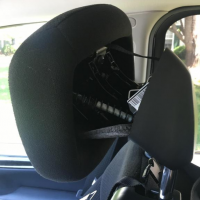— A Chrysler headrest that deployed without a crash caused a 2014 Ram C/V owner and others to file a lawsuit that alleges the active headrests make driving dangerous.
The owner says the Chrysler headrest deployed because of cheap plastic that cannot handle the internal pressures of the devices.
The headrest, known as the active head restraint, is supposed to help protect drivers and passengers from whiplash in rear-end crashes. The headrest propels forward to cushion the head to decrease the chance of cervical injuries.
But the class action alleges the head restraints suddenly deploy and knock occupants in their heads, all without any impacts to the vehicles.
Customers report trying to reset the deployed headrests only to learn they would need to pay hundreds of dollars to replace the head restraints. In addition, many customers claim Chrysler refuses to pay for repairs even when the vehicles are under their warranties.
According to the lawsuit, these Chrysler models are at risk of sudden headrest deployments.
- 2010-2018 Dodge Journey
- 2010-2011 Dodge Nitro
- 2010-2012 Jeep Liberty
- 2010-2017 Jeep Patriot or Compass
- 2010-2012 Dodge Caliber
- 2010-2018 Dodge Caravan
- 2011-2018 Dodge Ram C/V
- 2011-2018 Dodge Durango
- 2011-2018 Jeep Grand Cherokee
- 2010-2014 Chrysler Sebring
- 2010-2014 Dodge Avenger
- 2011-2018 Chrysler Town & Country
- 2011-2018 Chrysler 200
- 2011-2018 Chrysler 300
Chrysler Says Headrest Deployment Arguments Fail
Stellantis (Chrysler) filed a motion to dismiss the active headrest lawsuit by arguing the allegations don't hold up in a court of law.
According to the automaker, the Ram C/V owner who says his Chrysler headrest deployed can't bring his Arizona Consumer Fraud Act claim because he waited too long, making his claim time-barred. Chrysler argues a fraud claim must be brought within "one year of when the cause of action accrues."
But the plaintiff alleges his Chrysler headrest deployed in late-2018, yet he didn't file his fraud claim until February 2020.
Chrysler also argues a claim under New York’s General Business Law must be dismissed because the plaintiff fails to provide details about advertising.
The law prohibits “[f]alse advertising in the conduct of any business, trade or commerce or in the furnishing of any service . . . .” Chrysler says the plaintiff must point to a specific advertisement he relied upon when purchasing the vehicle.
But Chrysler says the plaintiff doesn't even claim a specific advertisement he was exposed to, much less replied upon.
Chrysler says at the most, the plaintiff alleges he “was aware of, reviewed, or heard Chrysler’s warranties and advertisements publicizing its reputation for safety and reliability.”
"This hopelessly generalized and vague allegation says nothing about the type of warranties or advertisements, or where he was exposed to them, or when." - Attorneys for Chrysler
The automaker also told the judge unjust enrichment claims should be tossed because the plaintiffs already have adequate legal remedies, and it is "well settled in Florida that unjust enrichment is an equitable remedy and is, therefore, not available where there is an adequate legal remedy.”
And finally, attorneys for Stellantis argue Magnuson-Moss Warranty Act claims should be dismissed the plaintiffs don't plead viable state law warranty claims.
Chrysler says none of the plaintiffs allege which terms of their express warranty were breached because the plaintiffs allegedly vaguely assert the automaker failed to comply with the terms of its written or express warranties.
The automaker also alleges the express warranty claims must be dismissed for three plaintiffs because they allegedly didn't provide the required pre-lawsuit notice as required under the law.
The Chrysler active headrest class action lawsuit was filed in the U.S. District Court for the Southern District of Florida: Nuwer, et al., v. FCA US LLC, et al.
The plaintiffs are represented by Kozyak Tropin & Throckmorton, Podhurst Orseck, P.A., Gilligan, Gooding, Batsel & Anderson, and Santiago Burger LLP.
The National Highway Traffic Safety Administration opened an investigation in September 2019 after Jeep Grand Cherokee and Dodge Durango drivers complained their Chrysler headrests deployed. However, to date the investigation is ongoing.

